Chapter 2 国际商务沟通与谈判
- 格式:ppt
- 大小:2.59 MB
- 文档页数:50
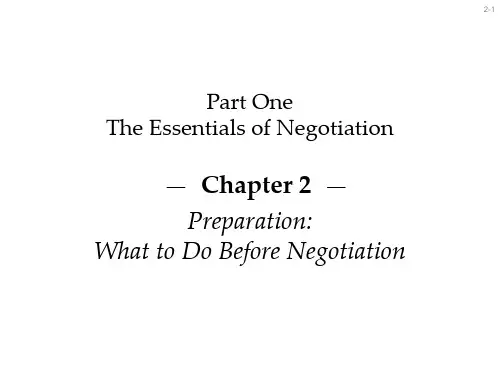
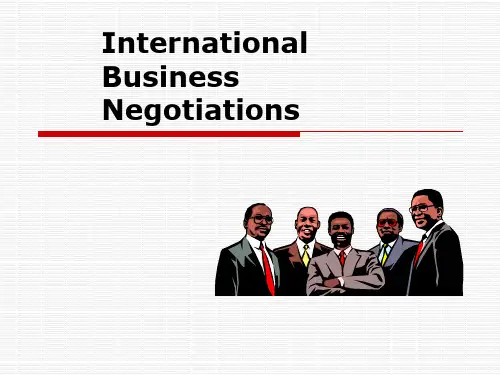
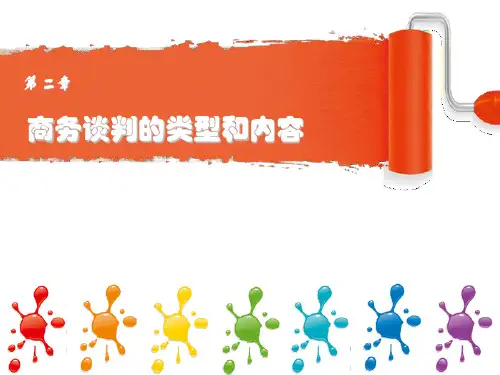

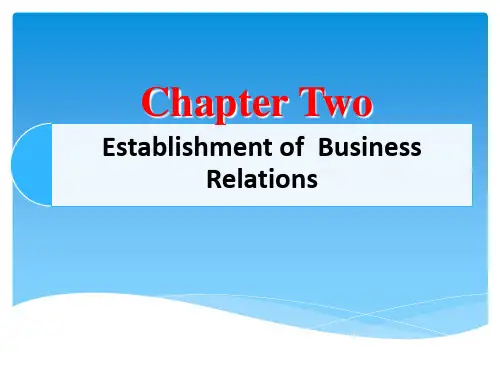
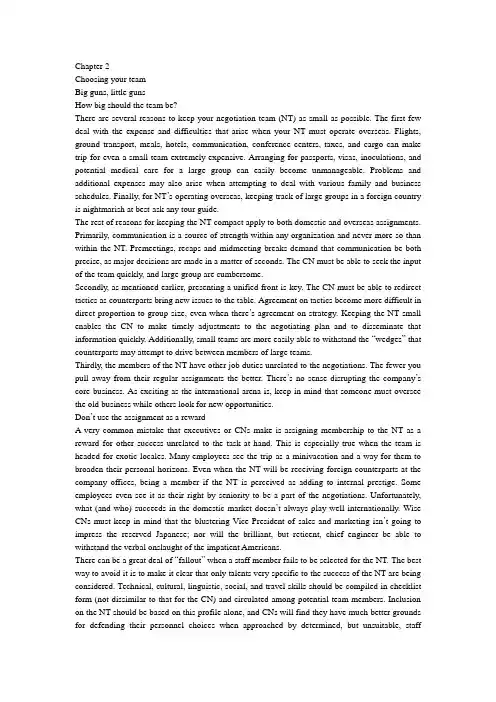
Chapter 2Choosing your teamBig guns, little gunsHow big should the team be?There are several reasons to keep your negotiation team (NT) as small as possible. The first few deal with the expense and difficulties that arise when your NT must operate overseas. Flights, ground transport, meals, hotels, communication, conference centers, taxes, and cargo can make trip for even a small team extremely expensive. Arranging for passports, visas, inoculations, and potential medical care for a large group can easily become unmanageable. Problems and additional expenses may also arise when attempting to deal with various family and business schedules. Finally, for NT’s operating overseas, keeping track of large groups in a foreign country is nightmarish at best-ask any tour guide.The rest of reasons for keeping the NT compact apply to both domestic and overseas assignments. Primarily, communication is a source of strength within any organization and never more so than within the NT. Premeetings, recaps and midmeeting breaks demand that communication be both precise, as major decisions are made in a matter of seconds. The CN must be able to seek the input of the team quickly, and large group are cumbersome.Secondly, as mentioned earlier, presenting a unified front is key. The CN must be able to redirect tactics as counterparts bring new issues to the table. Agreement on tactics become more difficult in direct proportion to group size, even when there’s agreement on strategy. Keeping the NT small enables the CN to make timely adjustments to the negotiating plan and to disseminate that information quickly. Additionally, small teams are more easily able to withstand the “wedges” that counterparts may attempt to drive between members of large teams.Thirdly, the members of the NT have other job duties unrelated to the negotiations. The fewer you pull away from their regular assignments the better. There’s no sense disrupting the company’s core business. As exciting as the international arena is, keep in mind that someone must oversee the old business while others look for new opportunities.Don’t use the assignment as a rewardA very common mistake that executives or CNs make is assigning membership to the NT as a reward for other success unrelated to the task at hand. This is especially true when the team is headed for exotic locales. Many employees see the trip as a minivacation and a way for them to broaden their personal horizons. Even when the NT will be receiving foreign counterparts at the company offices, being a member if the NT is perceived as adding to internal prestige. Some employees even see it as their right by seniority to be a part of the negotiations. Unfortunately, what (and who) succeeds in the domestic market doesn’t always play well internationally. Wise CNs must keep in mind that the blustering Vice President of sales and marketing isn’t going to impress the reserved Japanese; nor will the brilliant, but reticent, chief engineer be able to withstand the verbal onslaught of the impatient Americans.There can be a great deal of “fallout” when a staff member fails to be selected for the NT. The best way to avoid it is to make it clear that only talents very specific to the success of the NT are being considered. Technical, cultural, linguistic, social, and travel skills should be compiled in checklist form (not dissimilar to that for the CN) and circulated among potential team members. Inclusion on the NT should be based on this profile alone, and CNs will find they have much better grounds for defending their personnel choices when approached by determined, but unsuitable, staffmembers. This is especially true when other executives and managers assume they’re going to be part of the NT. As a way of preserving morale among those left off of the NT roster, some CNs make the deferrees part of the prenegotiation strategy planning process.A balance of skills and strengthsIt’s unlikely that any single team member will embody all of the talents necessary to achieve the company’s strategy. The CN must choose a cross-section of technical skills and personal attributes that will create a compact and efficient team. One team member’s weakness must be offset by another’s strength. Technical prowess must be a accompanied by the ability to communicate and apply that prowess. Putting a team together is similar to assembling a jigsaw puzzle: there’s no success unless all of the pieces fit.A common practice among experienced travelers when packing for trips is to never put anything in the suitcase that has “only one use”; the same applies to choosing NT members. A specialist candidate is eschewed in favor of the generalist unless the technical expertise is absolutely crucial to the effort. If the CN must include these “one trick ponies,” every attempt should be made to make them a part of the wider strategy and tactics discussions. If that’s unsuccessful, these specialist members should be cautioned to advise in private during negotiations and to avoid direct involvement.Painting the “big picture”Although many technical types will disagree, it’s much easier to impart technical knowledge to a good communicator than it is to do the reverse. Members of the NT must be chosen for their ability to effectively execute the company’s strategy and to quickly respond to the tactics of counterparts. This is accomplished only through good communications skills. Scientific and financial technical skills will take a back seat, especially during initial negotiations, as the “big picture” is discussed. Details will be left until much later in the process. Many business cultures prefer to have the details tended to after the contract is signed.Bringing massive technical data to the negotiating table may only slow down the deal-making process.NOTE: Much “expertise can be carried in file or laptop form, in case it should be needed during discussions.Tasks Both Large and smallMajor decisions are made every day during negotiations, but not all of the work is momentous. Some companies and consultant CNs make the mistake of including only “big guns” on the team. This causes problems, as no one relishes doing the necessary but tedious (and decidedly unglamorous ) work that keeps negotiations running smoothly—getting copies, typing policy changes, taking notes, arranging dinners, and so on .Including a few junior managers or administrators in the ranks of the NT for the sole purpose of controlling logistics is a wise move. This is particularly helpful if these members have experience working or traveling in the target market. Should the finances or domestic needs of the company preclude this option, these administrative duties should be assigned to specific members of the team, and it should be made clear that these duties are as important as any of the ,more “spot light”tasks. As is true in other areas of business, what happens behind the scenes determines success on the stage.Home Team Versus VisitorsThe respective sizes of the NT is usually determined by the group that’s visiting.This is particularly true if the visiting team is in the position of . “buying” from the home team or receiving group. The visiting group should forward a list of its members, stipulating the job title and responsibility of each. The receiving group should assemble their NT to correspond to the visiting team.It’s true that the receiving team has the psychological advantage of operating from their home turf, but they should resist the urge to overwhelm their visitors with an imposingly large NT. Since these resources can be called upon at any time, it’s best to see if they, re needed before arraying them. The ability to successfully exploit the discomfort of counterparts is very much related to one’s culture and requirements for a “success”. Some visitors may be in awe of your facilities and staff while others may consider it a visitors may be in awe of your is generally better when making initial contact.“Observer” TrainingCompanies that regularly pursue international trade and investment like to use negotiation as an ongoing training tool by purposely including less experienced members on the team. This allows them to gain experience that can be put to use in future international negotiations. It’s best to make it clear to these junior team members exactly why they’re being included in the NT so that they’re keen to gain as much experience as possible, get “bloodied” by their own mistakes, and learn from those of other team members .It’s also an ideal way for the company to see how their future CNs handle new and difficult situations. Many executives will attest to the fact that the “rising stars from the home office often become confused and ill-at-ease when put into the crucible of international negotiations and travel. Conversely, the mediocre manager may flourish in the new international environment.Those Who Can’“CUT IT”A common question in business when determining whether someone will be a success is , “Can they cut the muster?” (Sorry, folks, it isn’t mustard.) During the Middle Ages, the muster in question was the final pattern cut from cloth by journeymen to be used by the master tailor. Cut improperly, the pattern will never work, and valuable cloth will be ruined. International negotiations have a similar one-chance-is-all-you-get sense of finality. The NT acts as the journeymen and the CN is the master tailor preparing to stitch together a successful negotiation. Below are some types of people to avoid because they won’t be able “to cut it.”WHINERSEmployees who constantly complain, even under good conditions, are going to find travel and the stress of negotiations intolerable. These types love to bring up problems but never offer solutions. Every company has them, but successful negotiating teams don’t.CONNIVERSUnity is paramount for negotiations and people who like to work their own agenda or jockey for position will only undermine the team’s effort. These types are generally keen strategies and they may be useful in planning. However, under no circumstances should they ever take an active role in negotiations.HOTHOUSE FLOWERSMore competent than whiners, these “high maintenance”types can only excel under ideal circumstances. They never complain but are easily set back by the slightest deviation form the norm. Unfortunately, negotiations and overseas travel are rarely conducive to ideal anything. Sometimes, the NT must operate when materials and equipment are lost, or work in environmentsin which electricity is some trials reserved for special occasions. Technically astute or not, these “flowers” won’t travel well. If they must be used, do so only when negotiations are on home turf. An overseas team needs those that can adapt to any environment.BIGOTSNegotiations are a zero-sun game based on finding common ground amid very real and distinct differences. Adding racial, cultural, or class bigotry will only obscure an already complex state of affairs. Bigots (of any ilk) tend to communicate their prejudices more than they realize, and it’s not the kind of communication that leads to a successful deal.The frailRegardless of where the team originated, the world outside of the domestic market is filled with sights, sounds, smells, and tastes that pummel the visitor. Part of the success of the NT will be in its ability to assimilate as quickly as possible into the environment of their target market. The hygienic and culinary habits of counterparts and their culture may not meet the standards of the NT’s domestic scene. Members who can’t quickly and adequately adjust to new environments will only be a burden to the whole team, thus disrupting strategies and assignments. Like the CN, the team must be robust.Overseas? Domestic? One core team?Optimally, once a team is assembled, it should be used for both overseas and domestic negotiations related to international business. (Specialists may be added for individual negotiations.) This is especially true for smaller companies with limited resources. But large companies should not make the mistake of having two separate teams-one for overseas and one for domestic discussions-simply because they can afford the expense. Teams that have operated overseas will understand the stresses and strains being exerted on foreign teams when they come for business visits. This information, used sympathetically or otherwise, can be a key part of the overall strategy and daily tactics. Lastly, using the team for all negotiations will add to its ability to operate as a unit as team members become expert at all aspects of negotiating. They must be able to visit as well as host a negotiation and understand the responsibilities of being on either side of the table.。




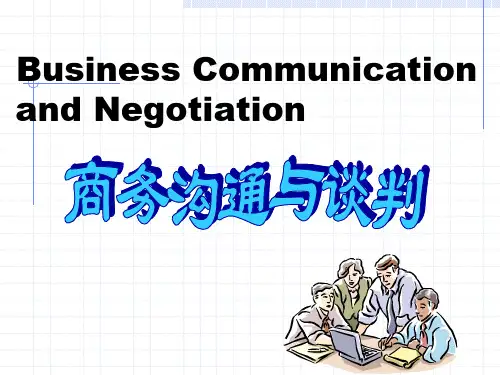
国际商务沟通技巧在全球化的今天,国际商务交流已成为不可避免的话题。
随着全球化进程的加快,国际商务的竞争也越来越激烈。
为了开展国际商务,有效地沟通是非常重要的。
在这篇文章中,我们将讨论国际商务沟通技巧。
第一部分:文化差异文化差异是国际商务沟通中的一个重要问题。
在国际商务中,要注意跨文化交流所带来的种种困扰。
比如,在中国,有一种非常重要的商业礼仪叫做“关系”。
许多中国商人非常看重这种人际关系,大力发展个人关系,建立良好的信任关系和合作伙伴。
在西方国家,人们更注重时间和效率,不太会在个人关系上浪费时间。
因此,在进行国际商务沟通时,必须学习和理解对方的文化差异,并了解与之相应的礼仪沟通规则,以便更好地沟通和理解。
第二部分:语言交流语言交流是国际商务沟通中的另一个重要问题。
在跨国企业和国际机构之间,英语通常是一个非常重要的沟通工具。
然而,不同的国家和地区会使用不同的语言和方言,这就对国际商务沟通提出了难题。
此外,即使使用通用语言如英语,有时也需要注意语音和口音的差异。
因此,在进行国际商务沟通时,必须注意发音,尤其是英语的重音和口音问题。
第三部分:姿态和面部表情姿态和面部表情是国际商务沟通中的另一个重要因素。
姿态和面部表情通常是展示人的情感状态和态度的方式。
在不同的文化和地区,姿态和面部表情的含义有所不同。
在美国和欧洲,握手通常是一种礼貌和友好的姿态,但在亚洲,低头示意和鞠躬更能表示尊重和友好。
此外,在某些文化中,直视对方的眼睛表示尊重和真诚,但在某些地方,这是不礼貌的行为。
因此,在进行国际商务沟通时,要注意对方的姿态和面部表情,以便更好地理解对方的意思。
第四部分:文字交流文字交流是国际商务沟通中的一个非常重要的部分。
随着电子邮件、即时通讯和其他数字化工具的广泛使用,文本交流已成为跨文化沟通的主要方式。
文字交流与语言和口音有关,因为在不同的文化和地域中,使用的语言和表述方式往往也不同。
在撰写商务文件或发送电子邮件时,需要考虑许多因素,例如社交礼仪、语言表述和时间语调等。
国际商务沟通与谈判国际商务谈判活动是人际间直接的沟通形式,其成效与谈判者的综合素质和信息解读的保真程度有关。
谈判者很可能来自非常不同的文化,亚文化的环境,面对陌生人自然会保持高度的戒心。
下面店铺整理了有关国际商务沟通与谈判的相关知识,供你阅读参考。
国际商务谈判中的跨文化问题不同的国家存在着文化的不同点,国际商务谈判中存在的跨文化问题主要通过语言、礼仪、禁忌与宗教信仰、谈判风格体现出来。
1.语言国际商务谈判大多用英语进行,而谈判双方的母语往往又不都是英语,这就增加了交流的难度。
在这种情况下,我们要尽量用简单、清楚、明确的英语,不要用易引起误会的多义词、双关语、俚语、成语。
也不要用易引起对方反感的词句,如:“to tell you the truth”,“I’ll be honest with you…”,“I will domy best .”“It’s none of my business but …”。
这些词语带有不信任色彩,会使对方担心,从而不愿积极与我们合作。
跨文化交流的一个严重通病是“以己度人”,即主观地认为对方一定会按照我们的意愿,我们的习惯去理解我们的发言,或从对方的发言中我们所理解的意思正是对方想表达的意思。
最典型的例子就是“yes”和“no”的使用和理解。
有家美国公司和一家日本公司进行商务谈判。
在谈判中,美国人很高兴地发现,每当他提出一个意见时,对方就点头说:“yes”,他以为这次谈判特别顺利。
直到他要求签合同时才震惊地发现日本人说的“yes”是表示礼貌的“I hear you”的“yes”,不是“I agree with you ”的“yes”。
实际上,“yes”这个词的意思是非常丰富的,除了以上两种以外,还有“I understand the question ”的“yes”和“I’ll considerate”的“yes”。